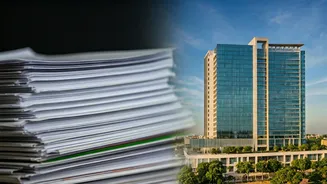What is Stamp Duty?
Stamp duty is essentially a tax levied by the government on legal documents, primarily those related to property transactions. It's a crucial part of the process,
and understanding its implications is vital for both buyers and sellers. It is calculated as a percentage of the property's market value. This tax revenue helps the government fund various public services and infrastructure development. The amount of stamp duty and registration charges varies depending on several factors, including the type of property, its location, and the specifics of the transaction. Paying stamp duty is mandatory to ensure the legality and validity of property-related documents. Without it, the documents cannot be officially registered, and the transfer of ownership isn’t legally recognized.
Calculating Stamp Duty
Calculating stamp duty in Bangalore involves a few key steps. First, the market value of the property must be determined. This is usually based on the guidance value set by the government or the sale agreement value, whichever is higher. Next, the applicable stamp duty rate is applied to this market value. Several factors can influence the final stamp duty amount, including the property's location within Bangalore, the type of property (residential, commercial, or agricultural), and the age of the property. The exact percentage varies but generally falls within a specified range, which the state government periodically revises. Always refer to the latest government notifications to ensure accurate calculation. Additional charges, such as registration fees and cess, might also apply, adding to the overall cost of the property transaction.
Factors Affecting Duty
Several factors affect the stamp duty charges in Bangalore. The location of the property is a primary determinant. Properties within the city limits often attract higher stamp duty rates than those in the outskirts or rural areas. The property type is another significant factor; residential properties typically have a different stamp duty rate compared to commercial or industrial properties. The property's age also impacts the stamp duty; older properties might be valued differently from newer constructions. Furthermore, the property's usage (e.g., whether it’s used for personal, commercial, or mixed purposes) also contributes to the calculation. Finally, the nature of the transaction itself, like a sale, gift, or mortgage, will influence the applicable rates and the overall costs associated with the stamp duty and registration.
Payment Methods Available
Paying stamp duty in Bangalore offers several convenient options. The traditional method involves physical payment through banks or government offices. However, with technological advancements, online payment methods have become increasingly popular. You can pay stamp duty online through the e-stamping portal or designated government websites. This allows for convenient payments from anywhere with internet access. When paying offline, payment can be made through authorized banks or at the sub-registrar's office. Make sure to keep all receipts and proof of payment, as these are crucial for completing the property registration. Choosing the right method depends on individual preferences and the specific guidelines provided by the local authorities, always verifying current procedures for accuracy.
Registration Charges Explained
In addition to stamp duty, registration charges are another crucial expense in property transactions. These charges cover the cost of registering the property documents with the relevant authorities. The registration fees are calculated as a percentage of the property value and vary depending on the type of document being registered. Registration is a mandatory process that validates the transfer of ownership and protects your property rights. The registration process usually involves submitting the required documents, paying the necessary fees, and having the documents officially recorded with the sub-registrar's office. You must have all the necessary paperwork, including the sale agreement, identity proof, and payment receipts, to complete registration. Failure to register the property can lead to legal complications and disputes in the future, making the registration process critically important.
Online Payment Procedure
Paying stamp duty online in Bangalore offers a streamlined and efficient process. Begin by visiting the official website of the Stamps and Registration Department of Karnataka or the designated e-stamping portal. Then, create an account or log in if you already have one. Next, fill out the required details about your property transaction, including property value and type. The system will calculate the stamp duty and registration fees based on the information provided. You will then be directed to a payment gateway to complete the payment using options like net banking, credit cards, or debit cards. After successful payment, generate the e-stamp certificate and take a printout. This e-stamp certificate serves as proof of payment and must be submitted along with other required documents for property registration. Always keep the digital records and printouts safe.
Offline Payment Guidance
To pay stamp duty offline in Bangalore, the process involves visiting authorized banks or government offices. Acquire the necessary forms and challans from the relevant authorities or download them from the official websites. Fill in the required details accurately on the challan, ensuring the property details and transaction specifics are correct. Submit the completed challan along with the required stamp duty and registration charges at the designated bank or government office. Obtain a receipt as proof of payment; keep this receipt safe, as it’s essential for the property registration process. You may need to visit the sub-registrar's office with your documents and the payment receipt to complete the property registration. Make sure to adhere to all guidelines provided by the local authorities to ensure a smooth and legal transaction.



















